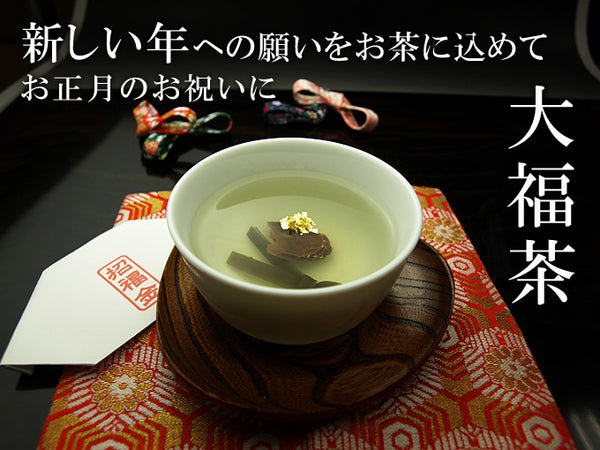

Obukucha
(0 products)
Obukucha is a traditional tea blend used to celebrate the New Year in Japan that contains a combination of sencha blended with ume (Japanese plum), konbu (kelp seaweed), and/or gold flakes in addition to other ingredients depending on the blender.
Obukucha (大福茶) - The Lucky Tea for a New Year
As one year winds to a close and we prepare for the next, it’s time to prepare for the annual tradition of sharing obukucha with friends and family for health and luck in the new year. The tea, and the tradition it embodies, hearkens back to a difficult time in Western Japan, when an epidemic threatened the livelihood of almost everyone in Kyoto and the surrounding area. Legend has it that the Buddhist priest Kuya shared a tea containing ume and kelp with visitors to help ease the symptoms of the illness.
The early name of the tea, spelled 皇服茶, meant the emperor’s drinking tea. Emperor Murakami was said to have enjoyed and benefited from obukucha. Because of natural language evolution, 大福, which means great luck, became part of the name, giving the tea its current name of obukucha, 大福茶, and its association with both luck and health in the coming year.
What’s Really in It?
At its most basic, obukucha is a tea makes you feel good. It was created to alleviate stress and the symptoms of illness, and as such, it traditionally contains very soothing ingredients. The original brew is said to have been little more than ume and kelp added to boiling water, but tea merchants over the generations have adapted different blends to perfectly match their tastes and those of their customers.
Most teahouses still include at least one of the three traditional ingredients of ume, kelp or gold flakes and mix it with sencha, genmaicha and other popular and soothing blends. Gold flakes are especially appropriate for obukucha served at major events any time of the year and serve as a reminder that tea at the temples was originally offered to Buddha then shared with guests.
The New Year’s Experience
The tradition of drinking obukucha for health at the start of every year comes from Rokuharamitsu-ji Temple in Kyoto. The Buddhist temple was founded by Kuya in 951 A.D. and became known for serving the beverage to visitors who came seeking succor or to admire the cultural treasures the temple holds. Many families enjoy obukucha as a way to share tea together and warm up after attending dondo yaki (どんど焼き), when they are ready to accept more incoming luck. Some offer the beverage to guests who visit during the first month of the year, while others keep it for special gatherings during the same time period.
Obukucha at Other Events
Obukucha is a common treat at many seijin no hi (成人の日) “coming of age” ceremonies, with the gold leaf brewed into the tea becoming a symbol of wishes for prosperity for the new adults.
Outside of the first month of the year, obukucha is often prized as a gift given and served at birthday celebrations and other important gatherings. There is no highly formalized ritual with this blend of tea, however, and it may just as easily appear as a treat for baby showers, marriage ceremonies or naming and baptismal events.
Experiencing Obukucha in Japan
The birthplace of obukucha, Rokuharamitsu-ji Temple, offers visitors a chance to attend a tea ceremony that includes the beverage brewed with the first water of the new year. The temple houses 60 obukucha cups that are treasured as Japanese cultural relics. The tradition of sharing the tea is honored at iconic tea rooms throughout Kyoto during the first month of the year, giving visitors a wonderful chance to experience a custom blend in any number of scenic and historical settings. Families, especially those with strong ties to tea culture or Kyoto, may serve the tea at home or share it with friends and coworkers at gatherings.
Preparing Obukucha
Yunomi offers multiple blends of obukucha, letting you choose the right flavors for your celebration and palate. As such, it’s best to look at the main ingredients and check the steeping techniques page to match the right brewing times with the obukucha you prefer. As with all teas, testing the blend with different temperature and volume combinations lets you customize it to your preference. This ensures you and your guests will get the perfect balance of flavors and more than a little luck and good health at celebrations any time of the year.
Description by Bradley Robbins, a travel writer with an unending love of tea and a lifetime of experience sharing samples, service and stories with friends and colleagues throughout North America, Europe and Japan. Catch him on Facebook or Twitter @ScratchpadBrad.
- Featured
- Best selling
- Alphabetically, A-Z
- Alphabetically, Z-A
- Price, low to high
- Price, high to low
- Date, old to new
- Date, new to old
No products found

